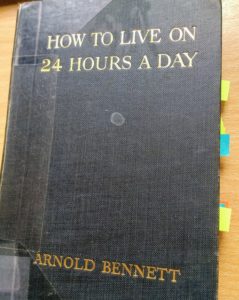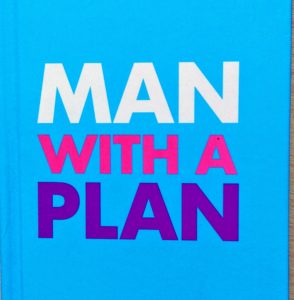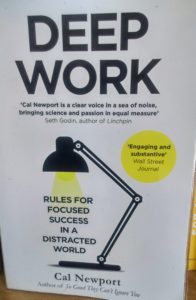Main Menu
Latest Blog Entry
User login
How to live on 24 hours a day
Time is precious, how do you budget it?
We all have 24 hours a day; it is one thing that unites us as humans. How we spend them differs vastly. Two Arnolds (Schwarzenegger and Bennett) have recently influenced my thoughts on how to spend my time. Here are some ideas on making the most of your time.

I shall use quotes from the following:
- Arnold Bennett’s excellent little book ‘How to live on 24 hours a day.’
- Cal Newport’s ‘Deep Work’ which offers very constructive advice about maximising your time.
- Arnold Schwarzenegger’s motivational video (see below) about achieving your goals.
What do you want to do?
Before you start trying to be more productive, you need to know what it is that you want to do with an extra hour a day.

- Look at more kittens on skateboard videos?
- Practice your drawing?
- Learn a new language?
- Get fit?
- Research your family tree?
- Read a book a month?
Far be it for me to judge what your interests are, but if you don’t know what you want to try and achieve with an extra hour, you will lack the incentive to make changes.
“I’ll live the focused life, because it’s the best kind there is.” Winifred Gallagher
Waking up every morning with a purpose will make a difference.
- Step 1: Think about what it is you would like to do if you were given an extra hour a day.
Or maybe for work related tasks, ‘Think about what you would like to do if you ONLY had one hour in the day.’
‘Busyness as Proxy for Productivity: In the absence of clear indicators of what it means to be productive and valuable in their jobs, any knowledge workers turn back toward an industrial indicator of productivity: doing lots of stuff in a visible manner.’ Cal Newport.
Eliminate the unnecessary
Once you know what you want to try and do, then you can free up some time.

‘Eliminate meetings, emails, social media, or put them in boxes. Have a digital sabbatical or a digital sabbath.’ Cal Newport.
20 years ago no one checked work emails at home; now a day off means only checking your emails twice. This means that valuable head space is taken up by thinking about work, rather than what you want to do.
‘If a man makes two-thirds of his existence subservient to one-third, for which he admittedly has no absolutely feverish zest, how can he hope to live fully and completely? He cannot.’ Arnold Bennett.
Bennett allocates 8 hours a day for work and 50 minutes each side of that for travel. Even if you hate your job, he suggests it shouldn’t ruin the rest of your time.
It is easy for me to say as someone who is self-employed, but I have always resisted the urge to have meetings and send emails. I joke that those in the public sector often say ‘I’ve had a busy day with meetings and emails.’
Whereas I say ‘I got nothing done because I had to go to meetings and reply to emails.’
If you are employed by an organisation that likes to have meetings to discuss the next meeting, then good luck. Otherwise, think about how you can say ‘No’ to things that won’t immediately impact on your work.
Newport recommends the digital Sabbath- taking one day off a week from electronic communication (including skateboarding kittens). For more important pieces of work: books, revision, articles or projects, then take a digital sabbatical for several weeks.
This will be extremely hard for those people who insist on sharing every meal they eat or every dog walk they take on Instagram. Hence the need for that burning desire in step 1.
Step 2: Eliminate the unnecessary from your work life and social life.
How much time is left?
It is worth watching this video featuring Arnold Schwarzenegger’s quote ‘Sleep faster’ on how to allocate time in your day. Arnold Bennett in 1908 came to a similar conclusion; 6 hours a sleep is enough, and the rest is just habit.
If you have 10 hours for work and travel, 6 hours for sleep, that leaves 8 hours for you. Take away two for household chores, ablutions and meal times and that leaves 6 hours for what you want to do.
Those of you with newborn infants, or caring for the Aged Relative will have additional responsibilities. This will eat into those 6 hours considerably.
When I had two children under 4, my brain was a fog and I learnt to exercise in 15 minute chunks as and when I could. I read Graphic Novels instead of books because I was so tired all the time. Relentless was the word constantly coming to mind.
Step 3: Work out how much time is left.
You will find an hour at least. If you can’t find the hour, sleep faster. Ninety minutes is a good amount of time, any more than that and you are likely to lose focus.
Newport talks a lot about having ninety minute focus periods throughout the day, with no more than four periods (6 hours) total. It is very hard to do high quality work all the time.
When are you at your best?
Are you up when the lark is on its wing and the snail is on its thorn? Do you enjoy the peace and quiet once the rest of the family has gone to bed?

When I started being strict with my 6 hours of sleep a night, I realised I had a choice: stay up later, or get up earlier. When I looked at what I achieve in the day before 0700 compared to what I achieve after 2100, the choice was clear. Get up earlier.
I get a head start on the day before the family awakens and descends down the stairs placing their various demands. You may prefer having your time at the end of the day. What is important is that you find the fit that works for you.
Then plan your hobby/ task at your best time of day. You want to start easily and build up. This is very important.
‘A failure at the commencement may easily kill outright the newborn impulse towards a complete vitality, and therefore every precaution should be observed to avoid it. The impulse must not be over-taxed. Let the pace of the first lap be even absurdly slow, but let it be as regular as possible.’ Arnold Bennett.
If you are trying to learn to play the piano, then Chopsticks rather than Chopin may be the best place to start. Gain some satisfaction in making time for yourself, and achieving step one.
If you compare yourself to a more accomplished / experienced practitioner, you are likely to quit. If you say ‘I could never write a short story as good as Margaret Atwood, so I won’t try,’ how will you ever improve?
The ridiculous comparison is an easy way to avoid failing at a task (I see it in athletes all the time).
‘I will not agree that, in this business at any rate, a glorious failure is better than a petty success. A glorious failure leads to nothing; a petty success may lead to a success that is not petty.’ Arnold Bennett.
Step 4: Start simply and gradually, build on small successes.
Enjoy the Journey
‘Life is a destination, not a journey‘ was my motto when I was competing. I was so focused on the outcomes, results and selection for squads and teams that I spent little time enjoying the moments.
That is the only thing I would change if I had the chance to repeat the experiences.
Once you have the inclination, the time and the purpose for your new task, set yourself up to enjoy the process. It may mean having a separate room, converting your garage to a gym or creating a ritual to transition from life to hobby.

‘The proper wise, balancing of one’s whole life may depend upon the feasibility of a cup of tea at an unusual hour.’ Arnold Bennett.
I ease my way into the day with a cup of freshly brewed coffee, thanks to my automated coffee machine. Once that is drunk, I can then start creating or doing, rather than consuming.
You may like to celebrate completing minor tasks with something rewarding. I would suggest matching the reward to the task, or at least not contradicting it. There is no point celebrating losing a kg of weight by eating a chocolate orange.
Step 5: Enjoy the journey, celebrate minor successes and learn from the failures.
Remember that you will stumble and fall, that is normal.
‘The path to Mecca is extremely hard and stony, and the worst of is that you never quite get there after all.’ Arnold Bennett.
Good luck with finding out what excites you -that is the hardest part. The rest is just logistics.
Further reading:
Recommended reading list for teachers and coaches
Client Testimonials
 Middlesex LTA
Middlesex LTA
James has been training the top performance players in the county and has proved a great success. The sessions are well organised and the feedback and the programmes given to the players are excellent.
More

